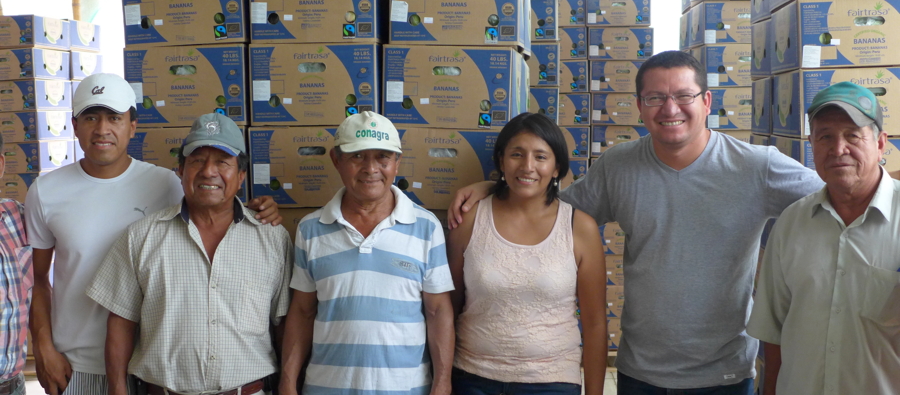Agriculture is in my blood: I come from a family of farmers near Sullana, Peru, who grew corn, rice, cotton, and bananas. But unlike many of my peers in my community, I was able to afford university studies, and graduated with a degree in agricultural engineering in 2002.
My early experience taught me that the life of a small-scale farmer is extremely difficult. For generations, small-scale farmers in my region were stuck in a rigid pattern. Farming was not profitable for them, and they couldn’t afford to feed their children well and send them to school. My goal as a professional was to create opportunity for families and young people to escape this pattern. But I didn’t know how.
I experimented with some jobs; first as the coordinator of my university’s center for experimental agriculture, which gave me my first experience as a manager of a large team; then in the local mayor’s office, where I was in charge of community development projects for young people. I learned a lot from both experiences, but was frustrated by bureaucracy. I yearned for the freedom and opportunity to turn my creative ideas into reality.
That opportunity soon came from the farmers I grew up with.
The banana industry was booming in my region, and several small-scale farmer cooperatives had formed. They were selling their fruit straight from the tree to a multinational fruit company, which controlled harvesting, post-harvest, and exporting. The cooperatives wanted to earn better prices, but they were limited by only having one large buyer.
One local cooperative was interested in Fairtrade certification, but didn’t know how to obtain it or re-invest the Fairtrade Premium. They hired me to help them.
I learned as much as I could to devise a plan for the cooperative. Over the next two years, I helped them obtain not only Fairtrade certification, but Organic and GlobalGAP as well, and we began re-investing their increased income in technology and infrastructure. We used every dollar well, and gradually gained more control of the supply chain. Eventually, we were able to branch out and sell to another company at a better price—a huge achievement for the small-scale farmers in our region.
The experience was a revelation for me. I was extremely impressed by the effect of Fairtrade on small-scale farmers, and saw how re-investing income wisely could lead to real change. Farmer incomes went up, and they gained independence and a sense of dignity. They could feed their families better and provide better education to their children—the key to escaping the pattern of frustration.
Soon, another life-changing opportunity came my way. Patrick Struebi, a social entrepreneur who founded the company Fairtrasa in Mexico in 2005, wanted to bring his innovative model to Peru. Fairtrasa had worked with Mexican farmers in much the same way I had with Peruvian banana farmers: helping them use certifications and re-investment to increase incomes and gain more independence. Fairtrasa does not seek profit at the expense of fairness and sustainability. Instead, farmer development and sustainability were the primary goals—and business was the means for accomplishing them.
Patrick asked me to co-found a new company, Fairtrasa Peru, and to lead a team of locals in implementing my expertise. We founded Fairtrasa Peru in 2010, and have had great success in our first 6 years. We now work with 14 farmer cooperatives, providing each with training and resources tailored to their specific needs. Many have transformed themselves from struggling subsistence farmers to certified Organic and Fairtrade exporters in only a few years.
I’ve found my calling as the leader of an exciting social enterprise. I work closely with farmers and visit the fields I love every day, but I also use my skills as an agronomist and development specialist to change communities. I lead an amazing team of young, passionate entrepreneurs like myself, dedicated to changing the way our food is produced and sold.
Our work has impacted the younger generations of people in our region. The idea of the life of a small-scale farmer has been fundamentally altered. It’s now possible to earn a living as a grower, and to support a family by farming a small plot of land.
Meanwhile, for young people with university degrees, there are much greater opportunities in the agricultural sector than before, up and down the supply chain. We need talented people for a variety of roles: quality control, logistics, community development, and running the new businesses that are changing our society.
In other words, the meaning of agriculture is changing for the younger generation. It was always fundamental to our lives and survival. But now it’s fundamental to our development and success. It used to be our only option. Now it’s a source of new opportunity.
I believe that what we’ve accomplished in my region in northern Peru is an example of what young people can accomplish everywhere in the world. Through leadership, innovation, and strong moral values—a commitment to each other and to the earth—we can use agriculture not only to survive, but to thrive.



